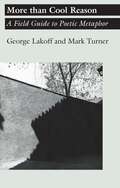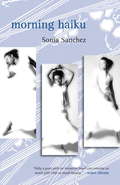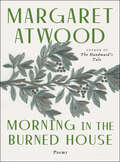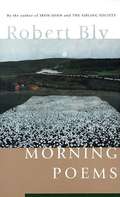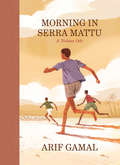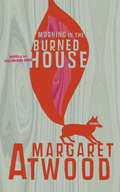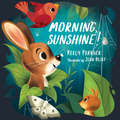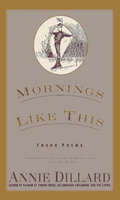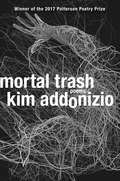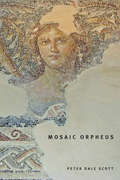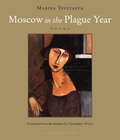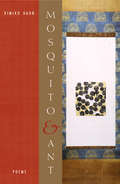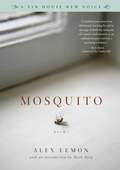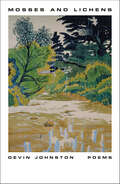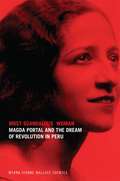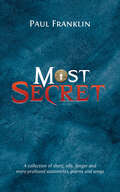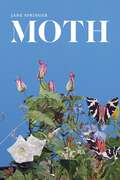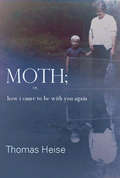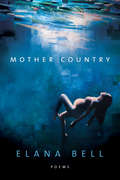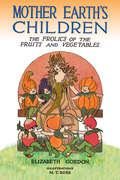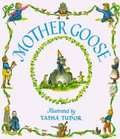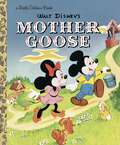- Table View
- List View
More than Cool Reason: A Field Guide to Poetic Metaphor
by George Lakoff Marl Turner"The authors restore metaphor to our lives by showing us that it's never gone away. We've merely been taught to talk as if it had: as though weather maps were more 'real' than the breath of autumn; as though, for that matter, Reason was really 'cool.' What we're saying whenever we say is a theme this book illumines for anyone attentive." — Hugh Kenner, Johns Hopkins University "In this bold and powerful book, Lakoff and Turner continue their use of metaphor to show how our minds get hold of the world. They have achieved nothing less than a postmodern Understanding Poetry, a new way of reading and teaching that makes poetry again important." — Norman Holland, University of Florida
Morning Haiku
by Sonia SanchezFrom a renowned African American poet, a new book of poems of celebration and loss for readers of all ages
Morning In The Burned House: Poems (Virago Poetry Ser.)
by Margaret AtwoodThe renowned poet and author of The Handmaid’s Tale “brings a swift, powerful energy” to this “intimate and immediate” poetry collection (Publishers Weekly). These beautifully crafted poems, by turns dark, playful, intensely moving, tender, and intimate, are some of Margaret Atwood’s most accomplished and versatile works. Some draw on history and some on myth, both classical and popular. Others, more personal, concern themselves with love, with the fragility of the natural world, and with death. Generous, searing, compassionate, and disturbing, this poetry rises out of human experience to seek a level between luminous memory and the realities of the everyday, between the capacity to inflict and the strength to forgive.
Morning Poems
by Robert Bly"Morning Poemsis a sensational collection -- Robert Bly's best in many years. Inspired by the example of William Stafford, Bly decided to embark on the project of writing a daily poem: Every morning he would stay in bed until he had completed the day's work. These 'little adventures/In Morning longing,' as he calls them, address classic poetic subjects (childhood, the seasons, death and heaven) in a way that capitalizes fully on the pun in the book's title. These are morning poems, full of the delight and mystery of waking in a new day, and they also do their share of mourning, elegizing the deceases and capturing the 'moment of sorror before creation.' Some of the poems are dialogues where unconventional speakers include mice, maple trees, bundles of grain, the body, the 'oldest mind' and the soul. A particularly moving sequence involves Bly's imaginative transactions with a great and unlikely precursor, Wallace Stevens. The whole is a fascinating and original book from one of our most fascinating authors." -- David Lehman
Morning in Serra Mattu
by Arif GamalA mosaic of interrelated stories exploding with personality, myth, and geohistorical weight, Morning in Serra Mattu is a profound, joyful meditation on life in modern Sudan. Arif Gamal seamlessly blends large-scale political realities with the local and the traditional: "old villages/whose ancient way is so composed/each single blade of grass is known/and in its place." Epic in scope, spellbinding in its intimacy, generosity, and wisdom, Morning in Serra Mattu is the book we didn't know we needed.how thrilling it was in the earliest morningto race barefoot down the sandy slopes and duneswith all the bellowing goatsand dogs and sheep and other animalsfor their first morning drinkand to swim in the fresh waters of the flowing riverwhile the thousand upon thousandof high unhindered Nubian stars began to fall awaybefore a tinge of milky line along the hillsuntil light grew from nearly nothingto an immensity-from "Return to Serra Mattu"
Morning in the Burned House
by Margaret AtwoodThese beautifully crafted poems-by turns dark, playful, intensely moving, tender and intimate-come together as Atwood's most accomplished and versatile gathering of poems to date, "setting foot on the middle ground/between body and word." Some draw on history, and on myth, both classical and popular. Other, more personal poems concern themselves with love, with the fragility of the natural world, and with death-especially in the elegiac series of meditations on the death of a parent-as they inhabit a contemporary landscape haunted by images of the past.Generous, compassionate, disturbing, this is poetry that emanates from the heart of human experience and seeks balance between the luminous realm of memory and the realities of everyday, between darkness and light, the capacity to perpetrate and the strength to forgive.Morning in the Burned House is infused with breathtaking insight, technical virtuosity, and a clarity of vision that has the force to change the way we look at our lives.From the Hardcover edition.
Morning, Sunshine!
by Keely ParrackAs we all wake up, the outside world bustles with life! Discover new facts about familiar creatures—from fluttering moths and scurrying beetles to shy foxes and humming bees—as they go about their morning activities. In the city, the countryside, and the suburbs, nature can be found everywhere!A series of haiku takes readers on a closeup, observational look at the amazing abundance of nature right outside our homes. Each stanza focuses on an aspect of the natural world or a creature going about their daily activities as the sun begins to rise. Alongside the haiku, informative text goes into depth about each subject—from how much honey a bee can make to the size of a hummingbird&’s egg. Instructions to help kids create their own haiku poems, a unique form of poetry from Japan, as well as a glossary add value for a STEAM and Core Curriculum book that can be enjoyed both in the classroom and at home.
Mornings Like This: Found Poems
by Annie DillardIn Mornings Like This, Annie Dillard extracts and rearranges sentences from old--and often odd--books, and composes ironic poems--some serious, some light--on the heartfelt themes of love, nature, nostalgia, and death. Clever, original, sometimes humorous, and often profound, this collection is sure to charm her fans, both old and new.
Mortal Trash: Poems
by Kim Addonizio“Kim Addonizio’s voice lifts from the page, alive and biting—unleashing wit with a ruthless observation.”—San Francisco Book Review Passionate and irreverent, Mortal Trash transports the readers into a world of wit, lament, and desire. In a section called “Over the Bright and Darkened Lands,” canonical poems are torqued into new shapes. “Except Thou Ravish Me,” reimagines John Donne’s famous “Batter my heart, Three-person’d God” as told from the perspective of a victim of domestic violence. Like Pablo Neruda, Addonizio hears “a swarm of objects that call without being answered”: hospital crash carts, lawn gnomes, Evian bottles, wind-up Christmas creches, edible panties, cracked mirrors. Whether comic, elegiac, or ironic, the poems in Mortal Trash remind us of the beauty and absurdity of our time on earth. From “Scrapbook”: We believe in the one-ton rose and the displaced toilet equally. Our blues assume you understand not much, and try to be alive, just as we do, and that it may be helpful to hold the hand of someone as lost as you.
Mosaic Orpheus
by Peter ScottWorking always to connect the polemical to the personal, Peter Dale Scott's political poems - from the tear gas of Berkeley protests in the 1960s to the problems of Thai forest monks in an era of drug-trafficking and deforestation - are a process of self-questioning. Self-questioning also marks his meditation poems, including a sequence on the death of his first wife. In opposition to contemporary poems of studied meaninglessness, Scott increasingly recognizes a compulsion in himself to radically reaffirm traditional rejections of the external world and turn to the refuges of poets before him, the enduring commonplaces that are more than cliches.
Mosaic Orpheus (Hugh MacLennan Poetry Series #43)
by Peter ScottWorking always to connect the polemical to the personal, Peter Dale Scott's political poems - from the tear gas of Berkeley protests in the 1960s to the problems of Thai forest monks in an era of drug-trafficking and deforestation - are a process of self-questioning. Self-questioning also marks his meditation poems, including a sequence on the death of his first wife. In opposition to contemporary poems of studied meaninglessness, Scott increasingly recognizes a compulsion in himself to radically reaffirm traditional rejections of the external world and turn to the refuges of poets before him, the enduring commonplaces that are more than cliches.
Moscow in the Plague Year
by Marina Tsvetaeva Christopher WhyteWritten during the Russian Revolution of 1917 and the Moscow famine that followed, these poems are suffused with Tsvetaeva's irony and humor, which undoubtedly accounted for her success in not only reaching the end of the plague year alive, but making it the most productive of her career. We meet a drummer boy idolizing Napoleon, an irrepressibly mischievous grandmother who refuses to apologize to God on Judgment Day, and an androgynous (and luminous) Joan of Arc."Represented on a graph, Tsvetaeva's work would exhibit a curve - or rather, a straight line - rising at almost a right angle because of her constant effort to raise the pitch a note higher, an idea higher ... She always carried everything she has to say to its conceivable and expressible end. In both her poetry and her prose, nothing remains hanging or leaves a feeling of ambivalence. Tsvetaeva is the unique case in which the paramount spiritual experience of an epoch (for us, the sense of ambivalence, of contradictoriness in the nature of human existence) served not as the object of expression but as its means, by which it was transformed into the material of art." --Joseph BrodskyWhile your eyes follow me into the grave, write up the whole caboodle on my cross! 'Her days began with songs, ended in tears, but when she died, she split her sides with laugher!'--from Moscow in the Plague Year: Poems
Moses
by Anthony BurgessA poem written as the basis for a television production of the life of Moses.
Mosquito and Ant: Poems
by Kimiko HahnThis breakthrough volume by award-winning poet Kimiko Hahn is her most rigorously "female" work to date as she reclaims the female body and reinvents an ancient Chinese correspondence. Mosquito and Ant refers to the style in which nu shu--a nearly extinct script used by Chinese women to correspond with one another--is written. Here in this exciting and totally original book of poems the narrator corresponds with L. about her hidden passions, her relationship with her husband and adolescent daughters, lost loves, and erotic fantasies. Kimiko Hahn's collection takes shape as a series of wide-ranging correspondences that are in turn precocious and wise, angry and wistful. Borrowing from both Japanese and Chinese traditions, Hahn offers us an authentic and complex narrator struggling with the sorrows and pleasures of being a woman against the backdrop of her Japanese-American roots.
Mosquito: Poems
by Alex LemonLyrical and explosive, this debut book of poetry explores a young man's experiences as a brain surgery patient, plumbs the depths of our greatest fears: death, pain, and illness, and emerges to find eroticism, wild new hope, and the wisdom to see the world in a wholly new way. Lyrical and explosive, this debut book of poetry explores Alex Lemon’s experiences as a brain surgery patient. Mosquito blends autobiography and poetry, bearing witness to a young man’s journey through serious illness and his emergence into a world where eroticism, hope, and wisdom allow him to see life in a wholly new way. Mosquito is a resilient meditation that is as much Zen as it is explosive, as clinical as it is philosophical and lyrical.
Mosses and Lichens: Poems
by Devin JohnstonA new collection from the author of TravelerNot days of angerbut days of mild congestion,infants of inconstant sorrow,days of foam in gutters,blossoms and snowmingling where they fall,a spring of cold profusion.If a rolling stone gathers no moss, the poems in Devin Johnston’s Mosses and Lichens attend to what accretes over time, as well as to what erodes. They often take place in the middle of life’s journey, at the edge of the woods, at the boundary between human community and wild spaces. Following Ovid, they are poems of subtle transformation and transfer. They draw on early blues and rivers, on ironies and uncertainties, guided by enigmatic signals: “an orange blaze that marks no trail.” From image to image, they render fleeting experiences with etched precision. As Ange Mlinko has observed of Johnston's work, “Each poem holds in balance a lapidary concision and utter lushness of vowel-work,” forming a distinctive music.
Most Scandalous Woman: Magda Portal and the Dream of Revolution in Peru
by Myrna Ivonne Wallace FuentesIn 1926 a young Peruvian woman picked up a gun, wrested her infant daughter from her husband, and liberated herself from the constraints of a patriarchal society. Magda Portal, a poet and journalist, would become one of Latin America’s most successful and controversial politicians. In this richly nuanced portrayal of Portal, historian Myrna Ivonne Wallace Fuentes chronicles the dramatic rise and fall of this prominent twentieth-century revolutionary within the broader history of leftist movements, gender politics, and literary modernism in Latin America. <p><p> An early member of bohemian circles in Lima, La Paz, and Mexico City, Portal distinguished herself as the sole female founder of the American Popular Revolutionary Alliance (APRA). A leftist but non-Communist movement, APRA would dominate Peru’s politics for five decades. Through close analysis of primary sources, including Portal’s own poetry, correspondence, and other writings, Most Scandalous Woman illuminates Portal’s pivotal work in creating and leading APRA during its first twenty years, as well as her efforts to mobilize women as active participants in political and social change. Despite her successes, Portal broke with APRA in 1950 under bitter circumstances. Wallace Fuentes analyzes how sexism in politics interfered with Portal’s political ambitions, explores her relationships with family members and male peers, and discusses the ramifications of her scandalous love life. <p> In charting the complex trajectory of Portal’s life and career, Most Scandalous Woman reveals what moves people to become revolutionaries, and the gendered limitations of their revolutionary alliances, in an engrossing narrative that brings to life Latin American revolutionary politics.
Most Secret: A collection of short, silly, longer and more profound statements, poems and songs
by Paul FranklinIt’s no secret that when children like poems or songs they’ll willingly give their approval. They are refreshingly ingenuous and will no doubt like some of this silliness. It’s sometimes harder for adolescents and adults to reveal their personal preferences, for fear of criticism or exposure. Although they may identify with some of the expressions of thought, observations or emotions in this book, they will at times keep their opinions secret. Most Secret offers enjoyment, interpretation, debate, as well as provocative and evocative thoughts across a range of age groups. Can you be trusted not to share the contents of this book with others?
Moth: Poems (Southern Messenger Poets)
by Jane SpringerIn Moth, Jane Springer uses shaped poems, prose poems, and poems with unusual structures to soar through time and the natural world. Yet, while her lines are aesthetically playful, she examines serious subjects, including our destruction of the environment, the widening and divisive gulf between socioeconomic classes, and the further injustices thrust upon those already suffering in society. She focuses on the role of women in a chaotic world, as mothers, daughters, and sisters work to restore order and comfort. Simultaneously heartbreaking and lighthearted, these masterful poems gracefully delve into the complexities of our lives.
Moth; or how I came to be with you again: Or, How I Came To Be With You Again
by Thomas Heise"A deeply melancholic and moving work of art."-Carole MasoEvery writer is a man or woman resuscitated, brought back for a little while before being dismissed. While I was hovering in bed barely asleep, my father would sneak in to check on me. Sometimes he came in the shape of a stranger, but his black eyes with a mark of sorrow never changed. When I was younger I could run so fast my shadow would fly off me. I would leave it behind in the city where I was born. There was no city, only my mother's arms. Dear grief, hermetic as a goat's skull. The future where you are, but how to get there except waiting another year.The narrator in Thomas Heise's adventurous novel tries to fuse together his present and past, abandonment by his parents, childhood in an orphanage, and a strong sense of disconnection from his adult life. The story is written in columnar, densely lyrical sections, looping and vertiginously dropping into the speaker's past, across several cities in Europe. W.G. Sebald, Samuel Beckett, and Michelangelo Antonioni's films come to mind, especially L'Avventura and Red Desert. Heise's language is precise (dirigibles "no larger than a fennel seed") and his lush, unfolding sentences offer a great, gorgeous pleasure. Moth is a haunting, one-of-a-kind novel that will stay with the reader for a long, long time.Thomas Heise is the author of Horror Vacui: Poems and Urban Underworlds: A Geography of Twentieth-Century American Literature and Culture. He teaches at McGill University.
Mother Country (American Poets Continuum Series #183)
by Elana BellMother Country examines the intricacies of mother–daughter relationships: what we inherit from our mothers, what we let go, what we hold, and what we pass on to our own children, both the visible and invisible. As the speaker gradually loses the mother she has always known and upon whom she has always depended to early onset Parkinson’s disease and mental illness, she asks herself: “How do you deal with the grief of losing someone who is still living?” The caregiving of a child to her parent is further compounded by anxiety and depression, as well as the pain of a miscarriage and the struggle to conceive once more. Her journey comes full circle when the speaker gives birth to a son and discovers the gap between the myths of motherhood and a far more nuanced reality.
Mother Earth's Children: The Frolics of the Fruits and Vegetables
by Elizabeth GordonAsparagus in early spring Came up to hear the robins sing; When she peeped out her dress was white;It turned green in the sunshine bright .This 100-year-old collection of eighty-seven whimsical verses features color illustrations that will delight both the young and the young at heart. From apples to yams, the rhymes offer an alphabetical parade of kids dressed as fruits and vegetables: a blushing strawberry, a playful radish, carrot ladies with green-feathered hair, and other children of the earth.
Mother Ghoul's Curses and Rhymes
by Sondi MillerMother Ghoul's Curses and Rhymes is a collection of Monsters' myths and legends that has been obtained at great risk to the author's life for the benefit of a ghoulish posterity. These poems are read at the bedsides of all monsterlings to keep their traditions of history and nightmares alive. Not recommended for Human Children under 13 years of age. Read it at your own risk. I dare you!
Mother Goose
by Tasha TudorThis Caldecott award winner includes seventy-six traditional nursery rhymes.
Mother Goose (Little Golden Book)
by RH DisneyVintage artwork and the classic Disney characters add a world of charm to these perennial Mother Goose nursery rhyme favorites–from “Peter Pumpkin Eater,” “Hey, Diddle, Diddle,” and “Little Miss Muffet” to “Jack Sprat,” “Simple Simon,” “Old King Cole,” and more. This Little Golden Book from the 1940s is a must-have addition to every Little Golden Book collector’s library.
